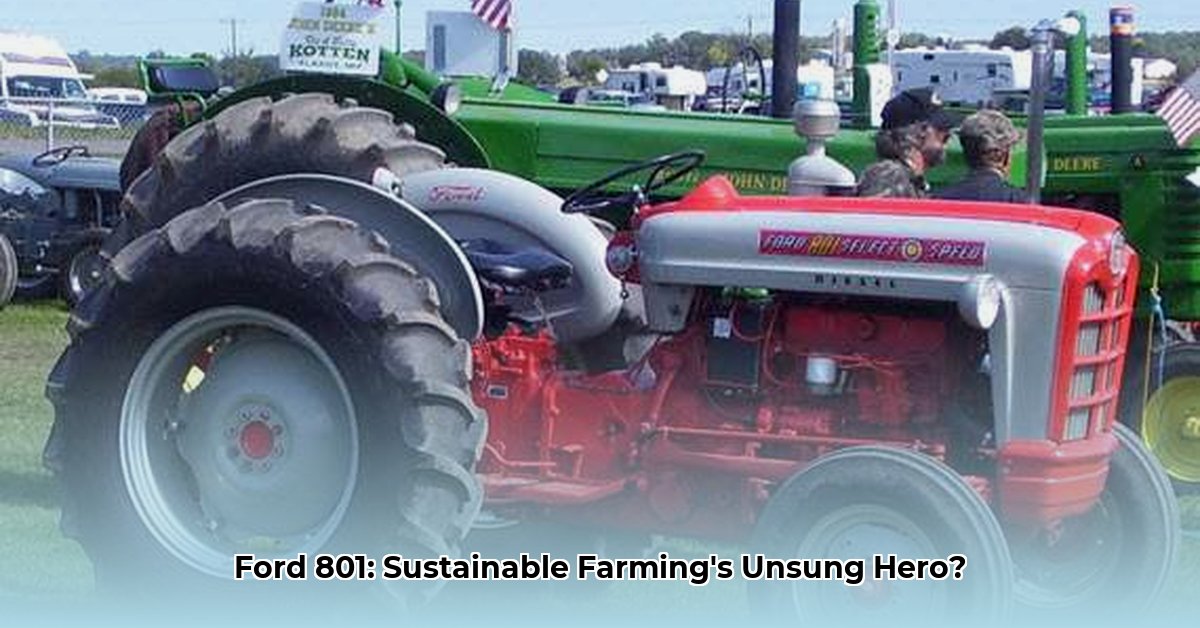
The Ford 861 Powermaster, a stalwart of American farms in the late 1950s and early 1960s, wasn't just another tractor; it represented a pivotal moment in agricultural history. Imagine vast fields stretching to the horizon, the scent of freshly turned earth mingling with the distinctive smell of diesel or gasoline, and the rhythmic drone of a hardworking engine – that was the world of the 861 Powermaster. Farmers needed robust and reliable equipment, and this tractor delivered, becoming a symbol of progress on American farms. Its unique ability to run on gasoline, liquid petroleum gas (LPG), or diesel fuel showcased remarkable adaptability for its time, a testament to the ingenuity and resourcefulness of the era. But how did this machine contribute to the evolving ideals of sustainable agriculture? For more on Ford tractors, check out this page on Ford tractor specs.
The Powermaster's Heart: A Look Under the Hood
The Ford 861 Powermaster's robust engine was designed to handle the demands of fieldwork. While precise fuel efficiency figures remain elusive due to a lack of standardized historical data, the very existence of multiple fuel options speaks volumes about its design philosophy: resourcefulness and versatility were paramount. It wasn't solely about brute strength; it was about maximizing the use of available resources. Did the ability to use alternative fuels like LPG represent an early, albeit possibly unconscious, step toward more sustainable practices? Compared to modern tractors, the 861 had its limitations. Its unsynchronized five-speed transmission demanded skill during gear changes, and the manual steering (optional power steering available) could be quite strenuous after a long day. Yet, these very limitations are part of the 861 Powermaster's charm, serving as a tangible link to a bygone era of farming.
Beyond the Field: The 861's Wider Impact
How did this machine contribute to sustainable agriculture? Quantifying its precise impact on soil compaction or greenhouse gas emissions using modern metrics is impossible due to the absence of detailed historical data. However, the 861 represents a crucial step in the evolution of large-scale mechanization. It laid the groundwork for future technological advancements that eventually resulted in the more fuel-efficient and eco-friendly tractors we see today. The option of multiple fuels hints at an early, if unintentional, exploration of alternative energy sources – a concept central to modern sustainable farming practices.
Preserving History: Collectors and Historians
What lessons can we learn from the Ford 861 Powermaster today? Dedicated collectors and museums play a vital role in preserving these machines, ensuring future generations appreciate the agricultural innovation of the past. These tractors are more than just relics; they are tangible testaments to the hard work and ingenuity of a bygone era. Historians meticulously research the 861's design, operation, and impact on farming techniques, adding to our understanding of its place in agricultural history.
Sustainable Farming: Lessons from the Past
Despite its limitations by today's standards, the Ford 861 Powermaster embodies a crucial principle of sustainable farming: resourcefulness. Its adaptability in fuel choices reflects a pioneering spirit essential for ecologically sound agriculture. It wasn't simply about maximizing crop yields; it was about maximizing the use of available resources. This mirrors a core tenet of modern sustainable agriculture: working with available resources. The 861 Powermaster, therefore, offers valuable insights into the importance of versatility and resource management in farming.
The Enduring Legacy
The Ford 861 Powermaster remains an enduring symbol of agricultural innovation. Its legacy extends beyond its mechanical specifications; it represents a significant step on the path toward more efficient and environmentally conscious farming practices. Its story reminds us that the journey toward truly sustainable agriculture is a continuous process, built on the foundations laid by innovative machines like this classic workhorse. The 861 Powermaster’s ingenuity inspires us to continue improving agricultural techniques and to appreciate the innovations of past generations. The enduring legacy of this machine continues to resonate with enthusiasts and historians alike.
- Key takeaway 1: The Ford 861 Powermaster’s adaptability to different fuel sources highlights its resourcefulness, a core principle of sustainable agriculture.
- Key takeaway 2: While lacking precise data on fuel consumption, the tractor’s design and the context of its time point towards a significant advancement in agricultural efficiency.
- Key takeaway 3: The continued interest in and preservation of the 861 Powermaster underscore its historical importance and enduring legacy in the evolution of farming technology.